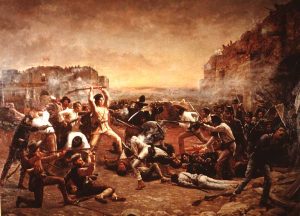The Manly Virtues: A Powerful Mercy
When the outnumbered defenders of the Alamo refused the Mexicans’ demand to surrender, General Santa Anna ordered his buglers to play “El Deguello” – a call meaning “no quarter”, a signal that no prisoners would be taken, and anyone surviving the assault would be put to the sword. As everyone knows, that’s precisely what happened – the entire garrison was killed in the battle or executed afterward, with the possible exception of a woman and a servant who were spared. A second and even more ruthless massacre followed at Goliad.
I was working on an audiobook dramatization of the story and searched in vain for a useable recording of “El Deguello.” There are plenty of American bugle calls in the public domain, but I thought it was indicative that the American military has no need of such a command. It’s been said of the U.S. Marines, for instance, that there is no worse enemy—and no greater friend—to those they encounter. That character of fair play and mercy are characteristic of our troops.
It is true that in the heat of conflict, sometimes passions run over. When the British dragoons under Lt. Col. Banastre Tarleton bayoneted American prisoners and wounded at the Waxhaws during the Revolution, it came back on their comrades a few months later. As the Carolina backwoodsmen surrounded British Major Patrick Ferguson’s men atop Kings Mountain, the battle climaxed with spontaneous cries of “Tarleton’s Quarter!” – meaning, the American militia didn’t intend to stop, either. To their credit, the patriot commanders rushed to restrain their men and were mostly successful. But the desire to punish brutality of Tarleton’s sort runs deep in righteous men … and that’s a far cry from the cold-blooded orders of a Santa Anna.
When I briefly lived in Germany during the 1980’s, there were marches and protests against America in West Berlin, Frankfurt, and Bonn, over U.S. plans to deploy certain new weapon systems in Europe. Where I was staying, though, we were just a few miles from the border with Communist-controlled Czechoslovakia. There, even we American college students were wildly popular with older Germans, who welcomed us into their homes and paid our bills in the local inns. See, they were thankful: many of them and their parents had rushed into the advancing American troops rather than risk the mercies of Stalin’s Red Army approaching from the east. They recognized that occupation, or even capture and imprisonment, under the U.S. Army would be tempered with that quality – mercy.
It does make you think. What other nation has spent billions in dollars and thousands of lives to grind a vicious dictatorship to dust, as we have done several times the past century, and then turned and invested still more to rebuild and restore the survivors of our former enemies? Our “nation building” activities in Iraq and Afghanistan are under criticism right now, and there is certainly room for debate, but who remembers the Marshall Plan? The Berlin Airlift? Who rebuilt post-war Japan? It was Americans, the victors, and our generals led each of those efforts. (True, George Marshall was Secretary of State by that time in 1948, but as Chief of Staff he was General Eisenhower’s superior until August of ’45).
It’s easy to forget sometimes that with the strength of a great nation, or a great army, or a great man, the call is not for revenge but restraint. There is a time to exert great and even overwhelming power to protect the weak and turn back evil – our national anthem says, “Then conquer we must, When our cause it is just” – but it must be conditioned by justice and the desire to reconcile when that becomes possible.
The anthem continues, “And this be our motto: In God Is Our Trust” That last bit makes the difference. Jesus said we are to “Be merciful, even as your Father is merciful” (Luke 6:36)—and that Father says of Himself, “I am merciful … I will not be angry forever.”(Jeremiah 3:12)
Today, Veteran’s Day, as we express our thanks to our soldiers, sailors and airmen of all ranks and ages, let’s take a minute to point out to our sons than along with their courage, discipline, self-sacrifice, and honor, there is a strong tradition of mercy—proving that it is a sign of strength and not weakness, flying in formation with all these other virtues.
Hal & Melanie
You can hear the complete stories of Kings Mountain and the Alamo in Hal’s dramatic audiobook rendering of
Hero Tales from American History
by Theodore Roosevelt & Henry Cabot Lodge
This post originally published at The M.O.B. Society blog.
Scripture quoted from the English Standard Version.



